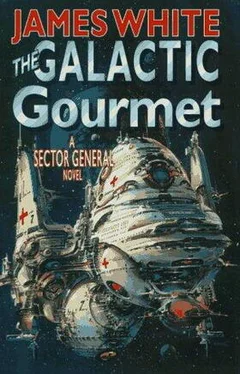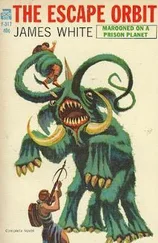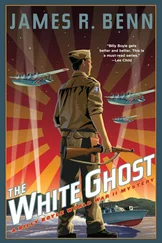“No,” said Gurronsevas. “In my time I, too, have played bominyat, but only at inter-city level, so Creon-Emesh and I will have that in common. I am most grateful, both for the suggestion and your offer of help, but I would prefer to do it myself.”
“If you are a bominyatti, too,” said Braithwaite, raising a hand to acknowledge and dismiss his thanks, “you have nothing to worry about. But enough of these games of devious diplomacy and calculated manipulation of obligations. What menu surprises are you planning for us?”
The off-duty accommodation of Creon-Emesh was spacious, for a Nidian, but tiny and claustrophobic so far as the majority of other species were concerned. The ceiling was so low that, even with his knee-joints bent to maximum flexion and his arms tightly folded, Gurronsevas’s head scraped the ceiling and his body threatened to dislodge the pieces of decorative vegetation hanging from the walls or demolish the ridiculously fragile furniture. An area on one side of the room had been cleared and the ceiling raised for the convenience of a more massive visitor, Thornnastor presumably, and he moved to it with relief.
“You are not here just to play bominyat,” said Creon-Emesh before Gurronsevas could speak, “so that can wait. Thorny keeps telling me that my place resembles a Tralthan rodent’s nest, so if you say anything polite about it I would not believe you. Please do not waste playing time. What is it exactly that you want of me?”
Gurronsevas tried not to take offense. The Nidians as a species, it was said by their many critics, were not particularly strong or intelligent or in possession of effective natural weapons that had enabled them to become dominant on their home planet; they had got there purely through their sheer, bad-tempered impatience to evolve. But he felt it necessary to display a modicum of good manners.
“Nevertheless,” he said, “I am obliged to you for agreeing to this meeting, especially as it is taking place when you are supposed to be off-duty.”
“Off-duty, on-duty, hah!” said the Nidian impatiently, nodding towards a display screen which was showing columns of figures rather than one of the entertainment channels. “It is the curse of the truly dedicated not to know the difference. But if what I hear about you is true, you have the same problem. What exactly is it that you want from me?”
“Information on ordering procedures, assistance and your discretion,” said Gurronsevas. The other’s bluntness of speech seemed to be contagious.
“Explain,” said Creon-Emesh.
But not too contagious, Gurronsevas thought. This was a situation which would need more than a few words of explanation. He said, “When I came to Sector General I carried few personal effects because, as you well know, Tralthans do not wear clothing and scorn the use of body ornaments. Instead I brought with me a quantity of herbs, spices and condiments native to Traltha, Earth, Nidia and the other worlds who practice the cooking of food with imagination rather than as a means of eliminating any harmful bacteria it might contain. Material from this personal store has been used to modify the standard meals of a few test subjects, and now I wish to incorporate them, as well as a number of other improvements I have planned, in the main dining hall menus. When I am forced to leave the hospital I would like to be remembered for something other than the accident in Bay Twelve, or wrecking the Chalder ward or—”
“Yes, yes, I sympathize,” Creon-Emesh broke in. “But what do you want me to do?”
“The material is used in very small quantities so far as individual meals are concerned,” Gurronsevas went on, “but if they are to be made available to everyone, which was my intention from the beginning, the small supply brought with me from Nidia will be exhausted within a week.”
“Then order what you need,” said Creon-Emesh. “You have a budget.”
“Yes, a generous one,” said Gurronsevas unhappily, “but regrettably insufficient. That is why I wanted to speak to Colonel Skempton, to have it increased. The supplies I need originate on a score of different planets, and the transportation costs alone would greatly exceed it.”
Creon-Emesh gave a sudden, sharp bark and said, “You are too innocent for your own good, Gurronsevas, and plainly you have been too busy to discuss this problem with anyone in Procurement. But your only concern lies with the preparation of food rather than how it reaches us. Had you not become a foul stench in Skempton’s nose, the Colonel would have educated you in our ways, as I am about to do. So listen carefully.
“You already know,” it went on quickly, “that the Monitor Corps is responsible for the supply and maintenance of Sector General. For this it uses a very small part of the Federation’s overall budget that finances the service as a whole. Supply includes providing us with species-specialized surgical instruments and equipment, medication, other-species atmospheres and, of course, food mass to top-up the synthesizer reservoirs as well as the Hudlar and Illensan food tanks which are more convenient to import. The Monitors also bring us patients who are beyond the clinical capabilities of the Federation planetary hospitals and are referred here for treatment, or the casualties of space accidents, or newly-discovered life-forms who are damaged or diseased or otherwise in need of medical care. Because the Corps vessels are not designed specifically for the large-scale transport of freight, they charter ships like Trivennleth to do the work. It is therefore possible, with a little creative accounting within your budget allowance, to purchase supplies from any part of the explored Galaxy and have the transport charges set against the Corps’ overall supply and maintenance budget, which is much too large for them to worry about what you are doing. Do you understand what I’m telling you?”
It was as if the artificial gravity grids in the floor had failed and he was about to float into the air, so great was the weight that had been lifted from him. But before Gurronsevas could find the words to express his understanding and his gratitude, Creon-Emesh spoke again.
“Naturally, the maintenance aspect does not concern you,” it said, and barked softly, “although recently you have been the cause of quite a lot of structural repairs being carried out. You have a list of your requirements?”
“Thank you, yes,” Gurronsevas stammered. “The principal items have been committed to memory. But will what you are doing for me cause you to smell as badly to Skempton as I do, or otherwise affect your chances of career advancement? And are you sure all this can be hidden from the Colonel?”
“To answer you in order,” said Creon-Emesh impatiently, “no, no and no. We cannot hide anything from the Colonel, the system we use precludes it. Skempton will be able to see everything we do but, as it has been said many times, life is too short to waste time checking every requisition order which, on average, number several thousand per day. He leaves that to trusted but obviously untrustworthy subordinates like myself. So long as the identification codes, routing instructions and quantities ordered are not abnormal they will be accepted without question. If any of the items are likely to arouse Supply Department’s suspicions, I’ll tell you to think again.
“And remember,” it went on, “ordering in quantity is preferable to periodic reordering of small amounts, which would increase the chances of what you are doing being detected. What are your principal needs?”
He tried to thank it again, but the other seemed to be interested only in his needs which, because of the little Nidian’s continued lack of objection, were becoming more ambitious and daring by the moment. But Gurronsevas’s enthusiasm was checked when Creon-Emesh barked suddenly and held up both of its tiny hands.
Читать дальше

![Гарри Гаррисон - Bill, the Galactic Hero [= The Starsloggers]](/books/87536/garri-garrison-bill-the-galactic-hero-the-star-thumb.webp)










